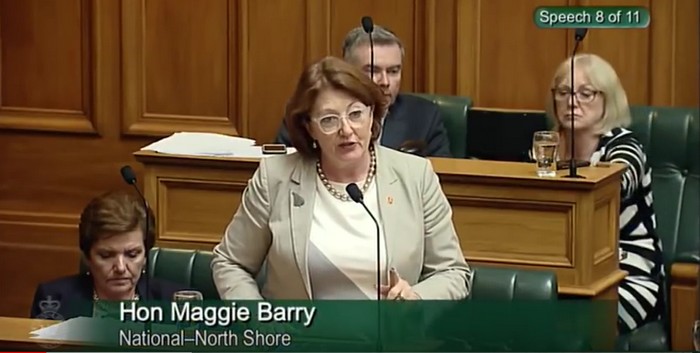End of Life Choice Bill – 1st Reading – Maggie Barry (National)

Thank you, Mr Speaker. There’s been a lot of talk tonight about choice, with this bill, and how important it is for people to have choice. But I ask you to pause and consider this all very carefully indeed. To give choice to some is to take away the choice of thousands of others, and this is the kind of situation that we are seeking to avoid as legislators.
We have heard from Bill English earlier that it is our responsibility as lawmakers to try and prevent the wrong things from happening, the unintended consequences, and we need to be very careful, because one person’s choice and autonomy will be another person’s death sentence. Hard cases make very bad laws, and our law, in my view, should not be changed for a few persistent cases where it will expose far greater numbers of people to premature death.
As the Minister for Seniors over the past three years, I have seen up close the horrors of elder abuse, the scourge where family members inflict physical, psychological, emotional, and mental violence and neglect on their own family members. More than three-quarters of abusers are family members. A family is not a safe place to be, and the abuse of our elders, with an ageing population, is something we need to take into account with this particular bill. This bill will enable more people to predate on the vulnerable, with far too few—negligible, even—protections and safeguards.
I read the previous two bills that have come before this New Zealand Parliament, but this one is by far the worst. It is poorly crafted and drafted, in my view. It is irretrievable through the select committee process. We’ve consulted widely with medical and legal experts and believe that the Seymour bill and version is so fatally flawed that it couldn’t even be fully rewritten to prevent vulnerable people from being predated on.
So let’s look at what this bill actually requires. A person needs to self-assess that they experience “unbearable suffering that cannot be relieved in a manner that he or she considers tolerable;”. What does that mean? It is way wide open to interpretation. For example, an 18-year-old—it could be your son or your daughter or grandchild, a person with a significant disability or a chronic illness, including mental illness, depression, or schizophrenia. Once that person, by simply expressing the wish—and that’s the word that is used, wish—to contemplate suicide, then there is an obligation on the medical practitioner to take it further. This highly prescriptive bill has a regime all of its own that triggers an automatic series of mandatory steps that a medical practitioner is then obliged to follow with the sole aim of facilitating that person’s death. How can an 18-year-old—or an 80-year-old, for that matter—make such a decision in a mentally unwell state?
Of course, they can’t get help from the doctor, who’s not allowed to recommend other treatments or even encourage the patient to discuss it with family. This is the detail of the reality of this bill.
If the doctor has a conscientious objection and won’t assist with the suicide, the doctor is then obliged and required to provide the patient with the names and contact details of practitioners on a special list of doctors who dispense death, who will facilitate the suicide. If they don’t refer them to someone on that list, that medical practitioner will be liable for criminal prosecution. But here’s the strange thing. For any doctor on the list who does assist a suicide, the bill provides a full defence and immunity, as long as they’ve acted “in good faith and without [actual] negligence”. So the full force of the law will not come upon that person but on the one who exercises their own conscience.
It’s putting our medical practitioners in an absolutely impossible situation, which is why they’ve all objected so strongly. The New Zealand Medical Association, the Australian and New Zealand Society of Palliative Medicine, nurses, geriatric medicine specialists—they’re all horrified by this bill and they’re on record with their objection on the basis that it is completely contrary to their code of ethics and relationship of trust with their patient. “Irreversible decline in capability” is used in the bill—essentially, that’s a definition of anyone living with a disability. So the clear message is, if you’re disabled in any way with an irreversible decline in capability, you’re better off dead.
The answer is not to coerce and to kill, as this bill dictates; it is to continue to invest in world-class palliative care, and that’s what we have in this country. Even if you are a person sympathetic to assisted suicide, this is not the bill to deliver it. And make no mistake about it, legalising assisted suicide and euthanasia is the exception and not the norm. New Zealand is on the right side of this. New Zealand law is adequate and has good provisions. We have world-class palliative care, and that is why I will never support this bill.






